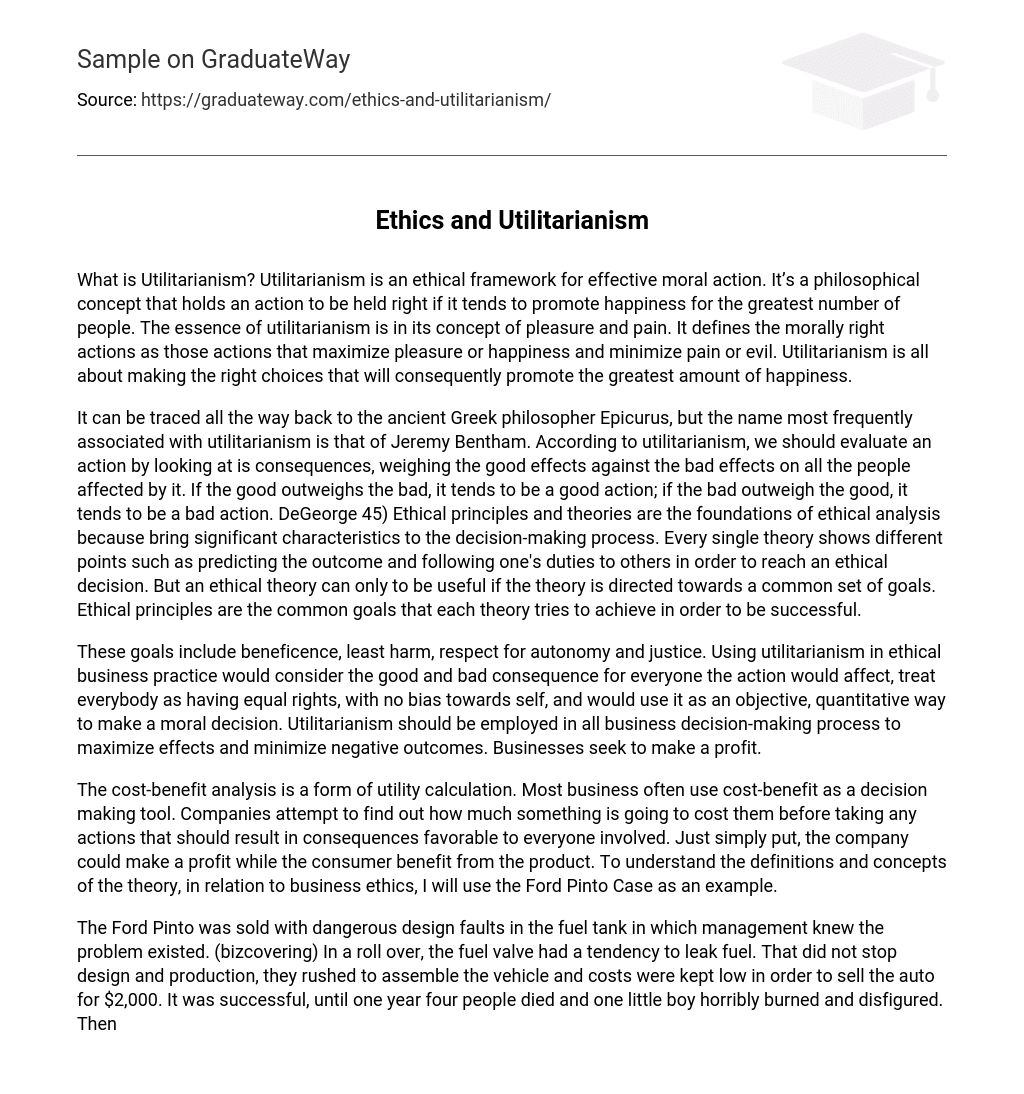Utilitarianism is a philosophical concept that emphasizes effective moral action by asserting that an action is morally correct if it enhances happiness for the majority. It focuses on pleasure and pain, deeming actions to be morally right when they maximize pleasure and minimize pain. Ultimately, utilitarianism prioritizes decision-making with the goal of attaining the utmost level of happiness.
The concept of utilitarianism can be traced back to the ancient Greek philosopher Epicurus, but it is most commonly associated with Jeremy Bentham. Utilitarianism suggests that when evaluating an action, we should consider its consequences and compare the positive effects to the negative effects on all those affected. If the positive effects outweigh the negative effects, then the action is generally considered good; if the negative effects outweigh the positive effects, then the action tends to be seen as bad. (DeGeorge 45) Ethical principles and theories serve as a foundation for ethical analysis because they bring important qualities to the decision-making process. Each theory offers different aspects, such as predicting outcomes and fulfilling one’s duties towards others, in order to make ethical decisions. However, an ethical theory can only be valuable if it aims to achieve a shared set of goals. These common goals are represented by ethical principles that every theory strives to accomplish in order to succeed.
Utilizing utilitarianism in ethical business practice involves considering the benefits, minimizing harm, respecting autonomy, and promoting justice. This approach evaluates the positive and negative consequences for all affected parties, treating everyone equally and making objective, quantitative moral decisions. Employing utilitarianism in all aspects of business decision-making aims to maximize positive impacts while minimizing negative outcomes. Ultimately, businesses strive to generate profits.
The cost-benefit analysis is a frequently employed utility calculation used by businesses for decision-making purposes. It assists companies in assessing the expected costs of an action and determining its overall benefits. The main goal is for the company to generate profits while also ensuring that consumers gain from the product. To illustrate the definitions and concepts of this theory in relation to business ethics, I will utilize the Ford Pinto as an example.
The Ford Pinto was sold with known design flaws in the fuel tank, despite management’s awareness of the issue (bizcovering). During rollovers, the fuel valve had a tendency to leak fuel. However, this did not prevent the production and sale of the vehicle, as it was hurriedly assembled to maintain a low cost of $2,000. Initially, this strategy proved successful until a tragic incident occurred. One year later, four individuals lost their lives and a young boy suffered severe burns and disfigurement. Subsequently, numerous other incidents followed, leading to Ford being sued and compelled to pay substantial compensation.
The engineers were aware of the car’s flaws but decided to sell it without making any safety modifications, which shows a selfish use of utilitarian principles. However, utilitarianism encourages a careful and unbiased assessment of consequences rather than prioritizing self-interest. It is a philosophy that evaluates the moral and ethical worth of actions based on their outcomes.
Utilitarianism is a moral theory that states the morality of an action depends on its usefulness or utility.
In the 1980s, Oliver North faced the challenge of explaining why he had misled congressional committees about his involvement in the Iran-Contra affair. This affair involved trading U.S. arms to Iran in exchange for the release of hostages held by Iran. North justified his deceptive actions using moral reasoning, stating “Lying does not come easily to me. But we all had to weigh the balance between lies and lives.” Thus, North’s behavior can be interpreted as an example of utilitarianism.
Utilitarianism disregards the means by which maximum benefits are achieved, including lies, manipulation, or coercion, as long as they benefit everyone involved. Originating as a radical philosophy, utilitarianism aimed to establish a moral system independent of divine revelation and biblical morality. Emphasizing outcomes rather than rules, utilitarianism has gained widespread acceptance due to its perceived sensibility and ease of application. It offered individuals an alternative path to leading moral lives without relying on the Bible and its principles.
Utilitarianism revolves around logic rather than blindly following biblical principles when making ethical decisions. Jeremy Bentham initially based his ethical system on the pursuit of physical pleasure and avoidance of physical pain, drawing from ancient hedonism. However, John Stuart Mill reformed this philosophy and separated it from its hedonistic origins. Mill still employed the utilitarian calculus but shifted focus towards maximizing the overall happiness by determining the greatest good for the greatest number.
Bentham and Mill are the founders of two distinct branches of utilitarianism. Bentham’s act utilitarianism focuses on evaluating each individual action, taking into account its specific details and context (DeGeorge 47). According to DeGeorge (47), act utilitarians believe that the utilitarian test should be applied to every action. On the other hand, Mill’s rule utilitarianism suggests applying utility to broader categories of actions rather than individual ones (DeGeorge 48). Mill argues that determining what is right involves comparing the consequences of different rules and considering all relevant factors for a particular situation. In summary, both forms of utilitarianism aim to make choices that promote the greatest happiness for the largest number of individuals.
Work Cited
Richard T. DeGeorge’s book, “Business Ethics,” published in 2010 by Prentice Hall in New Jersey, covers the topic of business ethics. Annie Lundy also examined the application of utilitarianism to business ethics in the Ford Pinto case on February 6, 2009. Henry R. West created the website “utilitarianism.com” as a valuable resource for information on utilitarianism. Claire Andre and Manuel Velasquez have also contributed to the understanding of the utilitarian approach to ethics.





